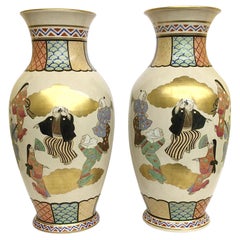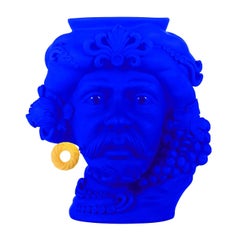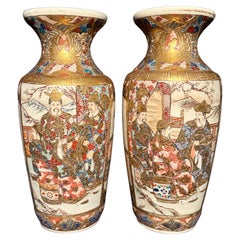Satsuma Pottery
to
1
1
1
1
1
1
1
1
1
1
1
1
1
18
72
35
34
32
Creator: Satsuma
Large Matching Pair Satsuma Meiji Era Figural Vases Figures in Clouds Gold Leaf
By Satsuma
Located in Ann Arbor, MI
LARGE Matching Pair Satsuma Meiji Era Figural vases figures in clouds gold leaf. Amazing multi color decoration. Vases display prominently from any decor...
Category
Early 1900s Japanese Meiji Antique Satsuma Pottery
Materials
Pottery
Related Items
In Stock in Los Angeles, Blue & Gold Pirate Terracotta Vase
By Stefania Boemi
Located in Beverly Hills, CA
Scroll down and click "view all from Seller" to see more than 500 other unique products. (2)
In Stock in Los Angeles
The bold Don Filippo Vase is part of a remarkable range of mytho...
Category
21st Century and Contemporary Italian Modern Satsuma Pottery
Materials
Gold Leaf
$1,356 Sale Price
20% Off
H 15 in Dm 12.2 in
Pair Of Japanese Meiji Period Satsuma Vases
Located in Norwood, NJ
Find pair of Meiji period Japanese Satsuma 4 panel vases. Each vase featuring one panel with scholars and one panel with samurai. The two side panels are floral. Wonderfully gilt and...
Category
Early 20th Century Japanese Meiji Satsuma Pottery
Materials
Ceramic
Japanese Satsuma Vase
By Satsuma
Located in New York, NY
A gorgeous hand-painted Japanese Satsuma vase, Meigi, circa 20th century, Japan. Beautiful hand-painted detail of colorful flowers and spider mum flowers around finished with gold de...
Category
20th Century Japanese Meiji Satsuma Pottery
Materials
Earthenware
Large Satsuma lidded vase, late 19th Century
By Satsuma
Located in Brighton, Sussex
A very impressive, fine quality Japanese Satsuma lidded vase. Having inset hand painted fan shaped panels depicting Warriors, ships, mountainous scenes, set between classical hand pa...
Category
Late 19th Century Japanese Antique Satsuma Pottery
Materials
Porcelain
Large Pair of Meiji Period Satsuma Vases
Located in Brighton, Sussex
A very impressive and decorative pair of 19th century (Meiji period 1868-1912) Japanese Satsuma flared neck vases. Each with wonderful gilded and hand-painted decoration. Depicting out door scenes of people on horse...
Category
Late 19th Century Japanese Antique Satsuma Pottery
Materials
Porcelain
Meiji period Satsuma vase.
By Satsuma
Located in Brighton, Sussex
A good quality 19th Century Japanese Satsuma vase, having imperial influences with a dark blue ground, blossom tree decoration to the flared neck, circul...
Category
Late 19th Century Japanese Antique Satsuma Pottery
Materials
Porcelain
Antique Meiji Era Japanese Cloisonné Enamel Vase
Located in Long Island City, NY
A rare elegant Japanese vase cast of metal, possibly brass, featuring a baluster shaped body and a wide short neck. The surface is decorated with a delicate image of a thistle flowe...
Category
Late 19th Century Japanese Meiji Antique Satsuma Pottery
Materials
Metal
Antique Japanese Meiji Era Ginbari Cloisonne Vase
Located in Long Island City, NY
An antique Japanese copper vase with polychrome cloisonne enamel decor. Late Meiji period, before 1912. Baluster shape, black body with ginbari decor representing a chrysanthemum flo...
Category
Late 19th Century Japanese Meiji Antique Satsuma Pottery
Materials
Enamel, Copper
Oversized Antique Satsuma Style Engraved Pottery Swan Vase, C1920
By Satsuma
Located in Big Flats, NY
An antique and large pottery vase in the manner of Satsuma offers pottery construction with engraved and hand painted pond scene with swans and stylized cloud elements, C1920.
M...
Category
Early 20th Century Asian Satsuma Pottery
Materials
Pottery
$600 Sale Price
20% Off
H 20.25 in W 9.75 in D 9.75 in
Pair of Antique Meiji Period Japanese Satsuma Vases Figural Decoration Marked
Located in Amsterdam, Noord Holland
Fabulous Japanese earthenware Satsuma Vase with nice decoration of flowers and figures decoration marked. Meiji period, 19th c
Lovely piece.
Marked base, both faded.
Additional in...
Category
19th Century Japanese Antique Satsuma Pottery
Materials
Porcelain
Large Japonese Vase Satsuma Circa 1930
By Satsuma
Located in Austin, TX
Large Japonese Vase Satsuma Circa 1930.
H / 13 inches.
Category
1930s Japanese Meiji Vintage Satsuma Pottery
Materials
Porcelain
Antique Japanese Meiji Era Cloisonne Enamel Vase
Located in Long Island City, NY
An antique Japanese Meiji era covered amphora shaped enamel over brass urn vase. The exterior of the vase is adorned with polychrome enameled continuo...
Category
Early 20th Century Japanese Meiji Satsuma Pottery
Materials
Brass, Enamel
Satsuma pottery for sale on 1stDibs.
Satsuma pottery are available for sale on 1stDibs. These distinctive items are frequently made of pottery and are designed with extraordinary care. There are many options to choose from in our collection of Satsuma pottery, although gold editions of this piece are particularly popular. Prices for Satsuma pottery can differ depending upon size, time period and other attributes — on 1stDibs, these items begin at $3,500 and can go as high as $3,500, while a piece like these, on average, fetch $3,500.
Questions About Satsuma Pottery
- Is Satsuma pottery valuable?1 Answer1stDibs ExpertApril 26, 2024Yes, some Satsuma pottery is valuable. The age, type, style and condition will determine how much a particular piece is worth. In addition, the history of ownership may also make a piece more valuable. For example, if a piece was previously in the collection of a notable person, such as a member of the Japanese Imperial Family, it may be worth more. To get an estimated value for a particular piece, consult a certified appraiser or knowledgeable antiques dealer. Find a range of Satsuma pottery on 1stDibs.
- 1stDibs ExpertApril 5, 2022Satsuma porcelain or pottery includes a maker’s mark with the name of the person who made the item. Japanese numbers may also indicate that a Satsuma piece was part of a collection. Genuine Satsuma pieces will not have a “Made in Japan” label and should only include Japanese characters. When in doubt, work with a certified appraiser to determine the authenticity of your Satsuma piece. Find a variety of expertly vetted Satsuma porcelain and pottery collectibles on 1stDibs.
- 1stDibs ExpertOctober 7, 2024The difference between Satsuma and moriage is that the former is a type of pottery, and the latter is a technique for decorating pottery. Satsuma pottery is the term for earthenware pottery from Japan's Satsuma region. Although there are different styles, the most common element of Satsuma pottery is a heavy, dark glaze. Moriage is the term for when potters add raised slip decorations to pottery, creating a three-dimensional effect. Some Satsuma pieces show off moriage details, while others do not. Shop a range of Satsuma pottery on 1stDibs.
- How do I date a Satsuma vase?1 Answer1stDibs ExpertMarch 22, 2022To date a Satsuma vase, study its mark. Vases made before World War II normally feature a mark in Japanese. A vase that says "Royal Satsuma" likely dates back to the late 20th century. You'll find a variety of expertly vetted Satsuma vases on 1stDibs.
- What is a Japanese Satsuma vase?1 Answer1stDibs ExpertOctober 12, 2021A type of Japanese pottery originated from Satsuma province in Japan is termed as Satsuma ware. A vase of this kind is known as a Satsuma vase. An interesting fact about Satsuma ware is that they feature a "makers mark" or marking as a key to help collectors unlock the value, age and authenticity of the piece. Shop a range of antique and vintage Japanese vases on 1stDibs.
- 1stDibs ExpertNovember 4, 2024To identify Satsuma pottery marks, you'll typically need to perform research using trusted online resources. Satsuma is a region in Japan known for its pottery, and many factories and artisans have operated there, including Kinkozan, Taizan, Yasuda, Choshuzan, Fuzan, Gyozan, Koshida and Maruni Kobe. Each maker has its own marks associated with it, and these typically are in Japanese kanji characters. You can compare the characters on your piece to pictures shared online to find a match. Alternatively, a certified appraiser or experienced antique dealer can help you identify your pottery markings. On 1stDibs, shop a selection of Satsuma pottery.
- 1stDibs ExpertFebruary 1, 2024One way to tell if your Satsuma vase is valuable is to look for markings on it. The oldest and typically most expensive pieces will usually have the Shimazu family crest — a circle with a cross through it — hand-painted on the bottom. If the piece is stamped with the marking or says "Made in Japan" in the Roman alphabet, it is a newer vase. Factors like the style of the vase and its condition will also impact its price. It's a good idea to have a certified appraiser or knowledgeable dealer evaluate your vase to determine its value. Find a variety of Satsuma vases on 1stDibs.
- 1stDibs ExpertSeptember 9, 2024Yes, some Satsuma pottery is worth something. Depending on their age, maker, type, style, condition and other factors, pieces may sell for a few hundred to several thousand dollars. Looking at sales and auction histories can give you a rough idea of the value of a piece. For a more definitive valuation, use the services of a certified appraiser or knowledgeable antique dealer. On 1stDibs, explore a collection of Satsuma pottery.


